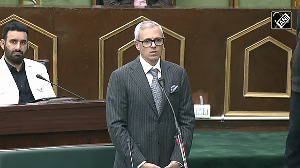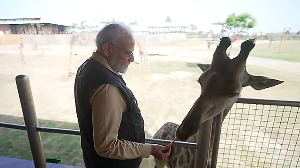'The question is really can we prevent half a million deaths.'
'We are fast approaching that number.'

Indian-origin American surgeon, New Yorker contributor and healthcare policy expert, Dr Atul Gawande was recently inducted to US President-elect Joe Biden's COVID-19 advisory panel.
"Unfortunately, we had neither a national commitment to the formula for success nor the leadership committed to do it," Dr Gawande tells Anjuli Bhargava about why the United States has the "worst performance in the world" on combating coronavirus.
How far to go in this battle for the US?
We have not seen the worst of it yet. Cases are still rising, so the question is really can we prevent half a million deaths. We are fast approaching that number.
We are, however, finally on a better path. The most moving thing for me has been to see the Republicans and Democrats finally burying their differences to come together in liberal and conservative states to roll out the vaccines to fight this.
People are beginning to listen again and mask-wearing is up. I'm hoping funding will be available to finance businesses that are taking the brunt
The US appears to be a textbook case of how to mishandle a crisis. Where and when do you think things began to go wrong?
Yes, we have the worst performance in the world. The most important tool you have in public health is messaging and communication. It was clear by the end of March or early April what the formula for success was.
Country after country, we saw this working. You needed to wear masks, maintain some social distance, not encourage large or even intimate gatherings indoors for a bit.
On the economic front, you needed to offer relief to businesses affected by this. And you needed to test aggressively. Those were very clearly the tools of mitigating and handling a pandemic such as this. The playbook was before you.
There are countries that are not small and are not richer -- like Vietnam and Thailand -- which have followed this playbook and handled this better. Unfortunately, we had neither a national commitment to the formula for success nor the leadership committed to do it.
The other part to tackling something like this is innovation and that is something the US excels at. The pharma companies have been committed to innovation and have moved ahead on the vaccine front, but it was clearly never going to be sufficient to deal with a crisis of this magnitude.
Hasn't India too managed this better than the US?
To be sure. One-third of the US hospitals are critically short of staff and they are filled to capacity with infected patients. We have not seen this in India except in small pockets.
To some extent, this can be explained by the practices followed: India locked down early and followed certain norms. Some of it is just luck and can be explained by the dynamics of the spread.
As the crisis unfolds, many in India have now got complacent on wearing masks and this remains a problem for both our countries.
It is heartening that India has the Serum Institute and others who can help it develop a vaccine, but we must remember that this is still a year away.
Meanwhile, although the cases have slowed and deaths have flattened, I don't think India is yet out of the woods, although the worst, I am hopeful, is behind us.
Having said that, the US is a richer country and we have not seen the same kind of pain on the economic front. The level of impoverishment and the financial stress one sees in India is far higher.
I have seen this closely as some of my own family members based in India say they have not been paid at all in nine months. They are frightened for their future and what it may hold.
What lessons can the world draw from this?
The most important thing is to act early and decisively. The countries that have been successful have done that, whether we look at Asia, Europe or New Zealand. Part of the reason certain countries moved quickly -- be it China, South Korea, Hong Kong or Singapore -- is because of their past experience of SARS. The playbook was before them.
Now that we have had this experience, I don't think we will waste the three months we did, watching it move from city to city and thinking, "Oh, this won't affect us".
Each step of the way, we'd argue for two or three weeks. "This is crazy, we're going to shut down travel?"; "We're going to shut down businesses; that's crazy"; and more arguments.
We argued about wearing masks and we continue to argue about wearing them even today till it's too late. But I think we all do know the playbook now and would deploy it much faster if something like this was ever to recur.
Second, it is always hard to invest in institutions that support public health, hospitals that prevent and address invisible and unforeseen dangers like the present one that can potentially become disasters for the world as a whole.
It's a bit like nuclear prevention. People assume it won't happen and they won't pay for it. I think at least this generation will have a higher commitment to public health.
Countries -- rich and poor -- have massively underinvested in the sector and I do expect this to change. We are now pouring money into these institutions to deal with the fire that's burning. This may go down as the crisis recedes. But I think going forward there will be much more appreciation of its value.












 © 2025
© 2025